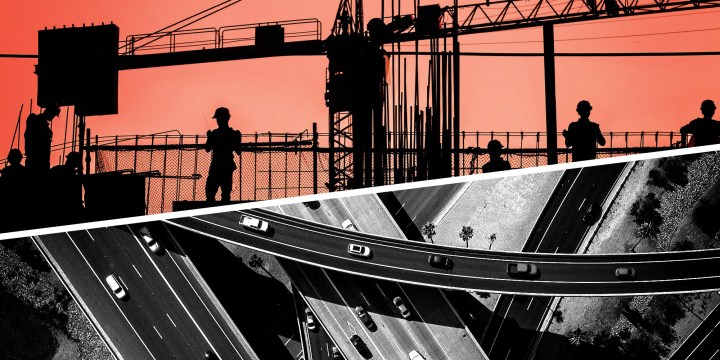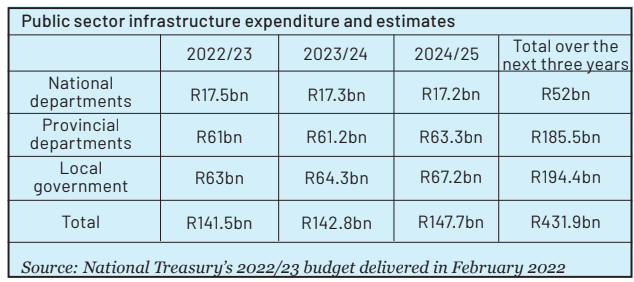A PAUCITY OF PROJECTS
Ramaphosa’s mega infrastructure roll-out plan failing to fly

President Cyril Ramaphosa wants the government to spend at least R100bn on infrastructure projects over three years. But National Treasury figures suggest that the budget for infrastructure projects is either reducing or the government is not spending money at all because it is struggling to get projects off the ground.
Is the government making progress in its drive to improve decrepit infrastructure in South Africa by pouring billions of rands into new projects that might pull the country’s economy out of the doldrums?
Not quite. The penny might have finally dropped for President Cyril Ramphosa’s administration that government-led infrastructure projects, which have been in perennial decline over the past 14 years, are the last card left for South Africa to grow the economy, create jobs and boost private-sector investments.
Infrastructure investments by the government and private sector are a centrepiece of Ramaphosa’s ambitious Economic Reconstruction and Recovery Plan, which was announced in October 2020 and aims to reindustrialise the economy after the Covid lockdowns.
Finance Minister Enoch Godongwana is responsible for finding money to bankroll public-sector infrastructure investments. Godongwana unveiled the government’s infrastructure investment priorities for the next three years, with a budget of R112.5-billion set aside for projects that focus on the delivery of water to communities, the building of bridges in rural areas, and towers that promise high-speed internet access for public schools and hospitals.
Godongwana’s Medium-Term Budget Policy Statement (MTBPS), delivered on 26 October, has outlined that spending on infrastructure spending will increase from R66.7-billion during the government’s 2022/23 fiscal year to R112.5-billion by 2025/26.
But a closer look at the numbers suggests that the budget for infrastructure projects is either reducing or the government is not spending money at all because it is struggling to get projects off the ground. The MTBPS is not usually designed to outline new spending priorities by the government, but provides an update to such priorities that are initially tabled in the February Budget.
And in February 2022, Godongwana announced huge amounts of money for infrastructure projects that would be spent by national, provincial and local spheres of the government, which collectively had a budget of R141.5-billion in 2022/23 (see table below) — substantially higher than the R66.7-billion mentioned in the MTBPS. And over three years, the main Budget in February pencilled in R431.9-billion for infrastructure projects — again, higher than the R112.5-billion budgeted.

Lack of capacity still hobbling infrastructure projects
The shortfall in the numbers remains unexplained by the National Treasury, which says more details will be provided in February 2023 when the main Budget is set to be tabled. But market watchers have proffered some possible reasons for this.
Intellidex, a research and consulting firm, is withering in its analysis of the government’s infrastructure push, saying there are several chronic problems with its execution. The government’s infrastructure drive has mainly focused on new buildings and the maintenance of existing infrastructure instead of embarking on big-ticket projects (such as factories, renewable energy plants and expanding rail lines) that can lift economic growth, which will be stuck below 2% over the next three years.
In a note to clients, Intellidex says infrastructure spending is mainly constrained by the government’s lack of capacity to break ground.
“There simply aren’t the engineers and project managers in local government and provinces to initiate and manage projects,” it says. This leads to South Africa having few or no new infrastructure projects to fund or showcase to private sector investors, who also want to put money into such projects through partnerships with the government.
But these investors have been deterred by laws such as the Municipal Finance Management Act and the Public Finance Management Act, which are designed to curb fraud and corruption, but have the unintended consequences of making it too bureaucratic for them to forge partnerships with the government on infrastructure projects.
The laws govern how public-private partnerships are formed and detail long processes that municipal and national government officials have to follow before projects are started and delivered. Intellidex has been calling for the laws to be amended to make it easier for the government to join forces with the private sector, which can take on the risk on infrastructure projects by putting in more capital instead of the government.
DM168 understands that some private-sector investors, who were keen to form partnerships with the government on infrastructure projects, have recently walked because of the cumbersome laws. This isn’t a new trend — potential partnerships have been collapsing since 2016, resulting in few new projects being registered.
Few projects on the ground
And years later, there is little progress to show in Ramaphosa’s big infrastructure investment push. The Infrastructure Fund, held by the Development Bank of Southern Africa (a state-owned development bank), was launched to prepare bankable infrastructure projects, derisking them by taking first losses and then attracting private sector funding.
The fund hasn’t delivered a large number of projects, even though it was recently given R4.2-billion by the Treasury but has since been pulled back. Grants worth R5-billion that have been allocated by the Treasury to municipalities to fund their projects have not been used. And according to Intellidex, of a projected 30 new schools to be built in the current fiscal year, only six were delivered in the first half.
State-owned enterprises (SOEs) such as Transnet, the Passenger Rail Agency of SA, and the South African National Roads Agency Limited have also been targeted by the government as a vehicle through which infrastructure projects will be delivered.
The Treasury expects SOEs to spend R251.7-billion on projects over the next three years. But the balance sheets of SOEs have deteriorated due to corruption and mismanagement, making it difficult to fund projects through their cash resources or borrowings. Transnet CEO Portia Derby has already warned that without financial support from the government, the state-owned port and freight rail operator cannot embark on large projects. Poor execution capacity at SOEs has also led to poor outcomes and poor-quality infrastructure.
South Africa lagging behind developed nations
South Africa is getting left behind in the infrastructure frenzy. Developed countries such as the US, the UK and China have recently pumped a lot of money into infrastructure projects to stimulate their economies after they were battered by the pandemic.
Spending money on infrastructure projects is considered an effective way to jumpstart an economy, although such projects usually take a few years to get off the ground due to implementation lags. Once projects get off the ground, construction spending will start peaking and be injected into the economy. Such spending creates blue- and white-collar jobs in the construction industry’s value chain, such as engineers, artisans and labourers.
Infrastructure projects can take years to complete, meaning that the jobs will stay. These workers then spend their income locally and help stimulate the economy. Once the projects are completed, citizens can use new infrastructure such as bridges and roads to travel more efficiently and improve their worker productivity.
South Africa hasn’t taken advantage of this multiplier effect because infrastructure spending by the government started declining in the early years of Jacob Zuma’s presidency. The government’s budget priority at the time was shifting money from pro-economic growth and investment initiatives to those of consumption, including bailouts for SOEs and increasing public sector wages.
Over the past 14 years, South Africa has moved further away from the National Development Plan’s (NDP’s) goal for fixed capital investments (including infrastructure investments) to reach 30% of GDP by 2030. From a level of 22% of GDP in 2008, fixed capital investment levels fell to 20.3% in 2015 and further down to 17.9% in 2019.
The Department of Public Works and Infrastructure, which in recent days has produced Version Two of a draft National Infrastructure Plan, estimates that to get to the NDP’s target of 30%, the government needs to spend an additional R6-trillion on infrastructure projects. That’s a lot of affordable homes, bridges, roads, electricity networks, broadband towers, and rail lines that will have to be built over the next eight years. DM168
This story first appeared in our weekly Daily Maverick 168 newspaper, which is available countrywide for R25.





















 Become an Insider
Become an Insider
The National Development Plan, like all similarly named plans trumpeted by the ANC government since 1994, is not a plan. It is at best some kind of nyaope-fuelled mission statement.
The ANC doesn’t know the difference between a plan and a dream, but this should come as no surprise. In its entire history the party hasn’t so much as put one Lego brick on top of another.
Instead, it presided over a period of history that saw somewhere between one and two trillion Rand, or about 34% of the South African economy destroyed through corruption.
Building “Homes” does not count as infrastructure spend.
With the exception of a few casinos built late nineties, and a few soccer stadiums leading up to 2010, this ANC government has steadfastly refused to contract existing heavy construction companies to undertake large infrastructure EP&C projects. Already ten years ago, the competent and experienced professionals key to successful realization of large projects had been driven to early retirement or emigration. What construction competence is left in M&R, LTA, Grinakers, Basil Read, Group 5 etc? Or in the infrastructure-focussed consulting engineering firms whose skills ensured professional design and supervision of successful projects?
I could name two major SA firms specialized in project engineering, procurement and construction management, which in 1980 employed over 2500 staff between them. The last, sad remnants of those once-drivers of infrastructure development were closed down about eight years ago. Their corporate competence will not be re-established in half a generation merely by Cyril and Enoch pencilling in a few billions against their dreams of smart cities and other wish lists.